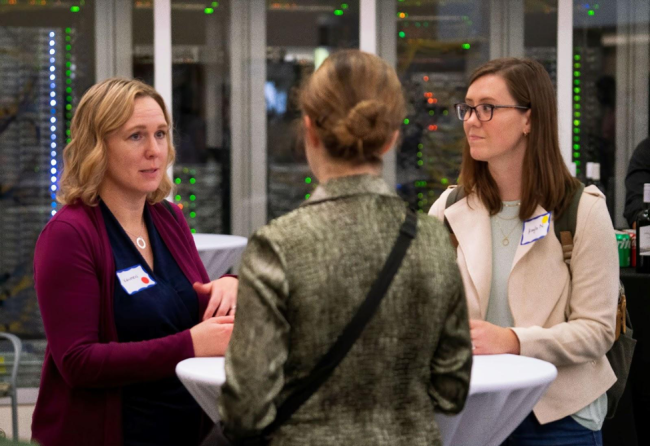You have /5 articles left.
Sign up for a free account or log in.

Howard Lipin
Today, when biomedical graduate students and postdoctoral researchers complete their training, they are confronted with an exceptionally challenging job market. After sometimes even as long as a decade of honing their skills, many now struggle to secure employment through methods that worked for their peers just a few years ago. This situation often leads to deep frustration, disappointment and anxiety, especially for international trainees, who may depend on employment to maintain their visa status.
One of the most valuable tools in a tight job market is building a professional network, a task often easier said than done. A network can lead to referrals, direct outreach to hiring managers and hidden job opportunities, as well as mentoring relationships that support personal and professional growth. While graduate students and postdoctoral trainees in the sciences receive extensive training and mentorship from their faculty advisers, expanding mentorship constellations can provide an invaluable networking function, offering students and postdocs an objective source of guidance and knowledge they can tap to help shape their career path.
But graduate students and postdocs, who are already balancing research, writing and job applications, can often find networking overwhelming. To help trainees build professional connections, one effective approach is to facilitate initial introductions. By lowering barriers to networking, we can significantly enhance the ability of graduate students and postdocs to navigate their career paths.
At our institution, Scripps Research, a nonprofit biomedical research institute that is also home to the Skaggs Graduate School of Chemical and Biological Sciences, we’ve leveraged our graduate student and postdoc alumni network to establish a new alumni mentorship program. Our current trainee population consists of about 400 graduate students and 300 postdocs. In the first two years of the program, we paired 87 graduate students and postdocs (mentees) with alumni (mentors) for one-on-one mentorship. We are pleased that all mentees who signed up for the program were matched. In future years, we plan to expand outreach to the alumni community to secure a larger pool of alumni mentors by obtaining more updated alumni email addresses and creating targeted LinkedIn ads.
The program was formed using guidance from the Science of Effective Mentoring in STEMM resources of the National Academy of Sciences, Engineering and Medicine, with pairings tailored to mentees’ career interests, field of study and shared identity with their alumni mentor. Through these relationships, mentees have launched their professional networks, often through introductions that lead to a snowball effect of growing connections. Moreover, mentors have guided mentees in exploring diverse career paths, building professional skills, refining application materials and have even provided psychosocial support during these challenging transitions.
The program is semi-structured and spans three to six months, with at least one meeting per month, typically via Zoom. The program equips mentors and mentees with mentorship training at the start and provides a resource guide with suggested discussion topics, such as career transitions, setbacks and challenges in life, strategies for developing resilience, and professional etiquette and communication. Program administrators host a virtual kickoff event that includes a popular speed networking and mentoring session. This year, we featured Harvard-trained geneticist Joanne Kamens as our keynote speaker, elevating our program launch. To ensure connections, we send a one-month check-in survey to address any challenges, such as mentees not reaching out to their mentors. We also assess outcomes to continually improve the program and offer folks the opportunity to suggest topics and other ideas about how to improve the program.
In this year’s 2024 cohort, a third-year graduate student passionate about structural biology remarked, “My mentor was incredibly dedicated and responsible. He provided me with a wealth of valuable advice on personal career development, and he actively guided every conversation we had. He introduced me to numerous networking resources and encouraged me to push beyond my comfort zone and tackle things I found intimidating.”
“As a result,” the student continued, “I experienced significant growth throughout the entire process. I gained a deeper understanding of my career and personal development goals, expanded my networking connections, and learned how to establish my own network effectively. Over all, I became more confident. I am extremely grateful to have met such an excellent mentor, and participating in this program has been a stroke of luck for me.”
Another mentee shared that the program “deepened my reflection on my goal in pursuing science, clarified the general expectations for success in the field, improved my presentation and grant writing skills, and fostered a resilient mindset.”
Our program objectives are listed below.
Objectives for Mentees
- Build a network of support and access to an additional mentor
- Prepare for careers both inside and outside academe
- Improve professional skills including networking, informational interviewing and career exploration
- Gain industry insights
- Foster an inclusive and supportive environment
- Provide psychosocial support
Objectives for Mentors
- Enhance alumni engagement with Scripps Research community
- Share knowledge and insights from professional experiences
- Develop leadership skills
Objectives for Organizations
- Support holistic training of graduate students and postdocs
- Enhance trainee professional development
- Expand connections with other institutes, organizations and industries
- Promote inclusion and belonging of trainees and alumni
- Improve alumni engagement and include a diversity of perspectives
- Provide career insights to inform current training opportunities at Scripps and areas of improvement
Additionally, we have assessed satisfaction based on four program goals:
- engagement activity,
- participant satisfaction,
- learning and development, and
- diversity, equity and inclusion.
We have found that 97 percent of the mentees would recommend this program to other Scripps Research trainees, and 80 percent of the mentors would recommend this program to other Scripps Research alumni, with some mentors reporting less satisfaction due to an unresponsive mentee.
We have learned that it is vital that we check in with both mentors and mentees about a month after the program has started to ensure the best match has been made. In some instances, a mentee has left Scripps Research, and we try to rematch the mentor with another mentee when possible. In the future, we’d also like to consider small group mentoring, as well as expand the pool of available alumni mentors through enhanced marketing efforts. By supporting our graduate students and postdocs in these ways, we can help them navigate the difficult job market and empower them to find success, even in difficult times.




